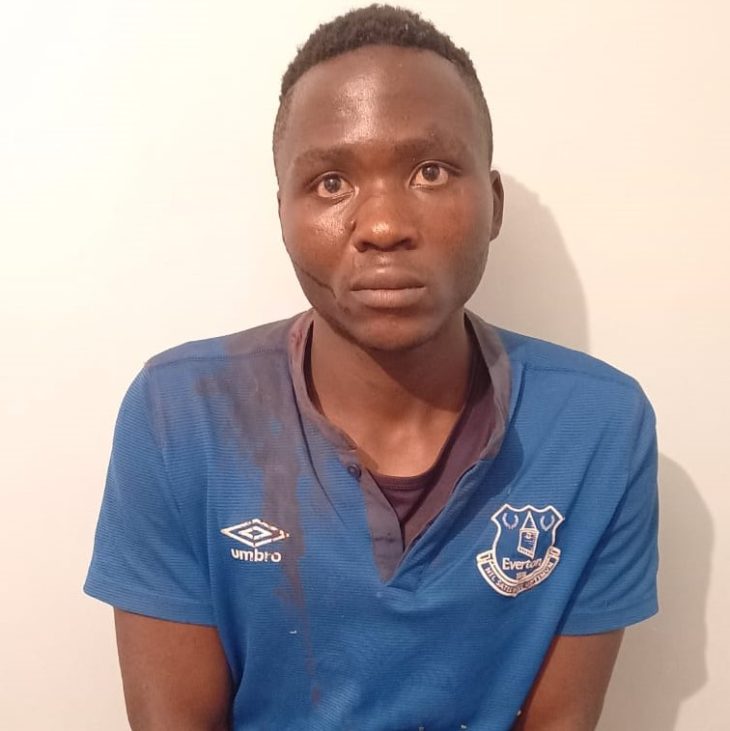NAIROBI, Kenya, Jul 14- Detectives are holding a suspect who confessed to having killed 12 children in Nairobi, in a shocking incident. He was identified by police as Masten Milimu Wanjala.
His victims include two children aged 12 and 13 years, who were recently reported missing.
The first child went missing on June 30 near Lower Kabete Approved School while the second one reported missing on July 8, in the same area. Both incidents were reported at Shauri Moyo police station.
“The suspect led us to where he dumped the bodies after killing the two boys,” a detective told Shahidi News.
Investigation into the killings is being led by detectives drawn from the DCI office in Buruburu police division.
Police are yet to establish the motive of the killings.
Nairobi Police boss Augustine Nthumbi told Shahidi News that the man had confessed to killing 12 people, all of them children.
It is not yet clear when he committed the alleged 10 other killings and whether the bodies were retrieved and taken to the morgue.
Police in Shauri Moyo are also looking for a 12-year-old child, who was kidnapped in Majengo area within Nairobi.
The case was reported on July 7 and four days later, the kidnappers asked for a Sh50,000 ransom.
“They warned that if I do not send the money, they would take my child to Tanzania,” Felista Wayua, the mother of the missing boy told police.
Police say “efforts to trace the culprits are ongoing.”
Cases of kidnappings have drastically increased in Kenya and mostly in urban areas.
In a travel advisory by the United States issued on June 16, Americans were asked to “exercise increased caution in Kenya due to COVID-19, crime, terrorism, health issues and kidnapping.”
The US identified Nairobi neighborhoods of Eastleigh and Kibera as hotspots of crime and kidnapping.
“Be especially careful when traveling after dark anywhere in Kenya due to crime,” reads the advisory.
Cases of kidnappings have been on the rise according to the National Crime Research Centre (NCRC).
“The rising incidents of the crime of kidnapping in Kenya have raised serious security concerns among citizens in general and security agents in particular. The research found out that the most prevalent types of kidnapping were: kidnapping committed by a stranger; inside kidnapping and kidnapping committed by a family member; kidnapping committed by an acquaintance and kidnapping with an intention to access monies from a victim’s automated teller machine,” NCRC said in a recent report.
Revenge was the major socio-economic motive for kidnapping whilst ransom payment was the major economic motive.
Political rivalry was identified as the key political motive for the kidnapping crime.
The main perpetuators of kidnapping were singled out as Kenyan males of age between 18-35 years and not averagely stable economically; strangers, friends and acquaintances, criminal gangs and militia, romantic partners and family members.
Victims of kidnappings are majorly Kenyan nationals; children and juveniles aged below 18 years, members of wealthy families, business persons, government officers and tourists.
Kidnappings are mainly executed by groups of kidnappers using illegal arms and weapons against victims to a large extent by use of force to get their victims and by enticing and luring victims.
Victims of kidnappings during kidnapping episodes encounter varied negative treatments and conditions such as physical abuse, sexual abuse, being killed, mental/psychological abuse, confinement and isolation, poor feeding and being drugged.
“Effects of the crime of kidnapping include: cause of fear among victims and other community members, disruption of social peace, post-traumatic stress and depression, loss of funds through ransom payment, reduction of economic investment, closure of businesses, reduction of business profits, commission of other crimes, disruption of educational programs and unnecessary increased cost of providing security,” NCRC said in a 2017 report on kidnappings in Kenya.
NCRC has called for strengthening of the Child Protection Unit within the National Police Service to focus on detection and prevention of crime against vulnerable children.
“The Tourist and Diplomatic Police Units should also be adequately facilitated for effective protection of vulnerable tourists and diplomats,” NCRC recommended.
“There is an ardent need to create a database of ex-public and private security officers and to undertake monitoring of their activities by the National Intelligence Service, Directorate of Criminal Investigations and Kenya Private Security Association in case some may be tempted to get into crime after exiting service.”
Want to send us a story? Contact Shahidi News Tel: +254115512797 (Mobile & WhatsApp)


